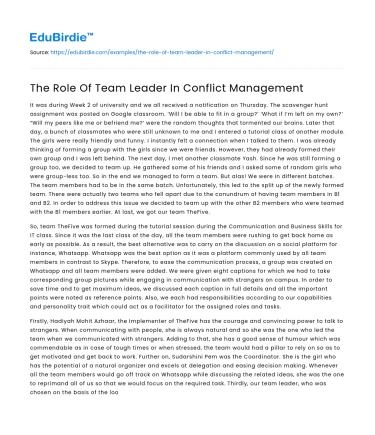Introduction
In today's dynamic and often complex organizational environments, the role of a team leader extends beyond mere task delegation and performance monitoring. A pivotal aspect of effective leadership is the ability to manage and resolve conflicts within a team. Conflicts, though inherently natural and sometimes beneficial for innovative thinking, can impede productivity and diminish team morale if not addressed appropriately. The team leader serves as the linchpin in navigating these disputes, employing strategies that not only resolve the immediate issues but also foster a culture of constructive dialogue. This essay explores the essential role team leaders play in conflict management, examining the skills required, strategies employed, and challenges encountered in this critical aspect of leadership.
Understanding Conflict and the Leader's Role
Conflict within teams can arise from a myriad of sources, including differences in personality, values, or opinions, as well as competition for resources or recognition. According to Thomas and Kilmann (1974), conflict can be categorized into functional, which enhances team performance, and dysfunctional, which detracts from it. The team leader must first identify the nature of the conflict to determine the appropriate management strategy. A skilled leader recognizes that not all conflicts are detrimental; in fact, some can spur creativity and innovation when managed effectively. As such, a leader's role is not only to resolve conflicts but also to harness them as opportunities for growth.
Save your time!
We can take care of your essay
- Proper editing and formatting
- Free revision, title page, and bibliography
- Flexible prices and money-back guarantee
Effective conflict management requires a leader to possess a high degree of emotional intelligence. Goleman (1995) emphasizes that leaders with strong emotional intelligence can empathize with team members, understand underlying emotions, and guide the team towards resolution. This involves active listening, maintaining impartiality, and facilitating open communication. For instance, when a conflict arises between team members over project responsibilities, the leader must mediate discussions, encouraging each party to express their viewpoints. By doing so, the leader not only helps resolve the current issue but also strengthens team cohesion and trust.
Transitioning between understanding conflict and the strategies employed by leaders, it is essential to note the significance of tailored approaches. Different conflicts require varied strategies, and a one-size-fits-all approach is often ineffective. The next section delves into specific strategies that leaders can utilize, illustrating their application through real-life examples.
Strategies for Effective Conflict Resolution
Leaders employ a range of strategies to manage and resolve conflicts, each suited to different scenarios and team dynamics. One commonly used approach is collaborative problem-solving, which involves the leader facilitating a dialogue that encourages team members to work together towards a mutually beneficial solution. This strategy is particularly effective when team members have shared goals and are willing to engage in open communication. For instance, in a case study conducted by Tjosvold (2008), teams that engaged in collaborative conflict resolution reported higher satisfaction and productivity compared to those that used avoidance or competition.
Another strategy is the use of compromise, where the leader helps conflicting parties find a middle ground. This approach may be suitable when time constraints require a quick resolution, though it may not always address the root cause of the conflict. Furthermore, leaders might employ accommodation, prioritizing team harmony over individual desires, or assertiveness, insisting on a particular course of action when necessary to maintain project integrity.
Despite the availability of these strategies, challenges persist in conflict management. Leaders often face resistance from team members who are reluctant to engage in conflict resolution processes. Additionally, cultural differences can complicate communication, requiring leaders to be culturally sensitive and adaptable. By anticipating these challenges, leaders can better prepare to address them, ensuring a more effective resolution process.
Transitioning to a broader perspective, it is essential to consider the counter-arguments that suggest conflicts should be avoided altogether. However, as discussed earlier, not all conflicts are harmful, and avoiding them may lead to missed opportunities for team development. The concluding section will further explore these counter-arguments while reinforcing the thesis on the indispensable role of leaders in conflict management.
Conclusion
In conclusion, the role of a team leader in conflict management is both multifaceted and indispensable. Through understanding the nature of conflicts and employing tailored strategies, leaders can transform potential disruptions into opportunities for innovation and growth. While challenges such as resistance and cultural differences can complicate the process, a leader equipped with emotional intelligence and effective communication skills can navigate these obstacles successfully. Counter-arguments advocating for conflict avoidance overlook the potential benefits of managed conflicts, underscoring the importance of a proactive leadership approach. Ultimately, the ability of a team leader to manage conflict effectively is crucial in fostering a productive and cohesive team environment, highlighting the leader's vital contribution to organizational success.






 Stuck on your essay?
Stuck on your essay?

